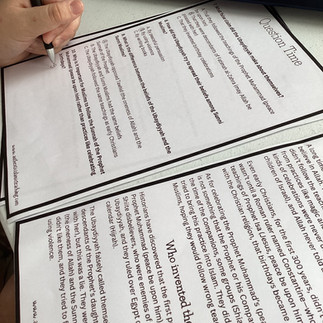In today's world, celebrating birthdays is seen as a common event. Many people, including some Muslims, take part in these celebrations without questioning where this tradition came from. This blog post will dive into the origins of birthday celebrations and discuss whether celebrating the Mawlid (the birthday of Prophet Muhammad, peace be upon him) has any place in Islam.
The Origins of Birthday Celebrations
The practice of celebrating birthdays did not begin with Muslims or the Prophets. In fact, birthday celebrations were first practiced by some of the greatest disbelievers in history. These included figures like the Pharaohs of ancient Egypt. The celebrations they held had strong ties to magic, astrology, and the casting of horoscopes—practices that are completely forbidden in Islam. These types of celebrations were never part of the teachings of Allah or His Prophets.
For the first 300 years of Christianity, even Christians did not celebrate birthdays. It was only during the reign of the Roman Emperor Constantine, a man who mixed Christian teachings with old pagan customs, that birthday celebrations became part of Christian culture.
The Introduction of the Mawlid (Prophet’s Birthday) Celebration
Celebrating the birthday of Prophet Muhammad (peace be upon him), known as the Mawlid, was never something the Prophet himself, his Companions, or early Muslims practiced. In fact, this practice was introduced centuries after the Prophet’s time by a group of disbelievers and enemies of Islam called the Batini Ismaili Shiite disbelievers. They were also known as the Ubaydiyyah, and they ruled over Egypt during the 4th century of the Islamic calendar (Hijrah).
This group falsely claimed to be the descendants of the Prophet’s daughter, Fatimah al-Zahra (may Allah be pleased with her). They called themselves the Fatimiyyah to deceive the people. Their goal was to spread their false teachings and mislead Sunni Muslims into practicing things that were never part of Islam, such as the Mawlid celebration.
Why Celebrating the Mawlid Is Not Part of Islam
The Prophet Muhammad (peace be upon him) taught us to follow Tawhid —the belief in the oneness of Allah—and to strictly follow his Sunnah (his way of life). Neither the Prophet nor his Companions ever celebrated the Prophet’s birthday, and they never encouraged others to do so. The Prophet’s way is the only way we should follow, and adding new practices like the Mawlid can lead us away from the true teachings of Islam.
Comprehensive Question Resources for Children
To help the younger generation of Muslims better understand the importance of staying away from practices like celebrating the Mawlid and birthdays, I have created a comprehensive question resource specifically designed for Muslim children aged 7 and over. This resource explains, in a clear and age-appropriate way, the historical origins of these celebrations and why they have nothing to do with Islam. The questions and activities are meant to show children the value of following the Sunnah and the importance of adhering to the teachings of the Prophet Muhammad (peace be upon him).
Link for resource:https://www.authenticislamicteaching.com/product-page/is-celebrating-birthdays-and-the-prophet-s-birthday-mawlid-allowed-in-islam
By providing children with the correct knowledge, they will be better equipped to avoid practices like birthday celebrations and the Mawlid, understanding that these customs come from outside of Islam and were never part of the teachings of the Prophet. This resource aims to instill a strong sense of Tawhid and commitment to following the pure Sunnah from a young age, helping them grow into confident Muslims who are clear about what is and isn’t part of their religion.
The Importance of Following the Sunnah
Muslims are encouraged to follow the Sunnah of the Prophet Muhammad (peace be upon him) in all aspects of life. Allah says in the Qur’an:
"Say if you do love Allah, then follow me. Allah will love you and forgive you your sins." (Qur'an 3:31)
This verse is a clear reminder that the love of Allah is shown through following the Prophet Muhammad (peace be upon him). Any act of worship or celebration that was not part of the Prophet’s Sunnah is not an acceptable way to seek Allah’s pleasure. Celebrating birthdays, including the Prophet’s, does not bring us closer to Allah, but instead moves us away from the pure teachings of Islam.
Conclusion
The origins of birthday celebrations, including the Mawlid, are rooted in practices that are far from the teachings of Islam. As Muslims, we should focus on following the authentic Sunnah of the Prophet Muhammad (peace be upon him) and avoid introducing practices that were never part of his life or the lives of his Companions.
Instead of celebrating birthdays, we can honor the Prophet by learning about his life, following his teachings, and strengthening our commitment to Tawhid and the Sunnah. True love for the Prophet Muhammad (peace be upon him) is shown by obeying his teachings and living our lives according to Islam, not by adopting practices from other cultures or religions.
This is my summary of a few pages in the book.
If you would like to read more about this topic and see for yourself the origins of these practices, you can purchase the book from our website, In’shaa’Allah. This is the book I used as a reference for creating this resource.
- #Mawlid
- #Sunnah
- #Shia







Comments